Highlights from Pitti Uomo 95 in Florence
Away from the racks of smart, serviceable sartorial savoir faire, the energy and sleaze of Y/Project – the Pitti Uomo 95 Special Guest – burst forth, as a sign that its creative director Glenn Martens isn’t here to play it safe. Elsewhere, performance-driven clothes were cut a tech-savvy jib at Z Zegna, Aeance and Rossignol. And the rugged Caledonian landscape and its rich design heritage influenced patterned loafers at Fratelli Rossetti and the deconstructed argyle knits and prints at Pringle of Scotland.
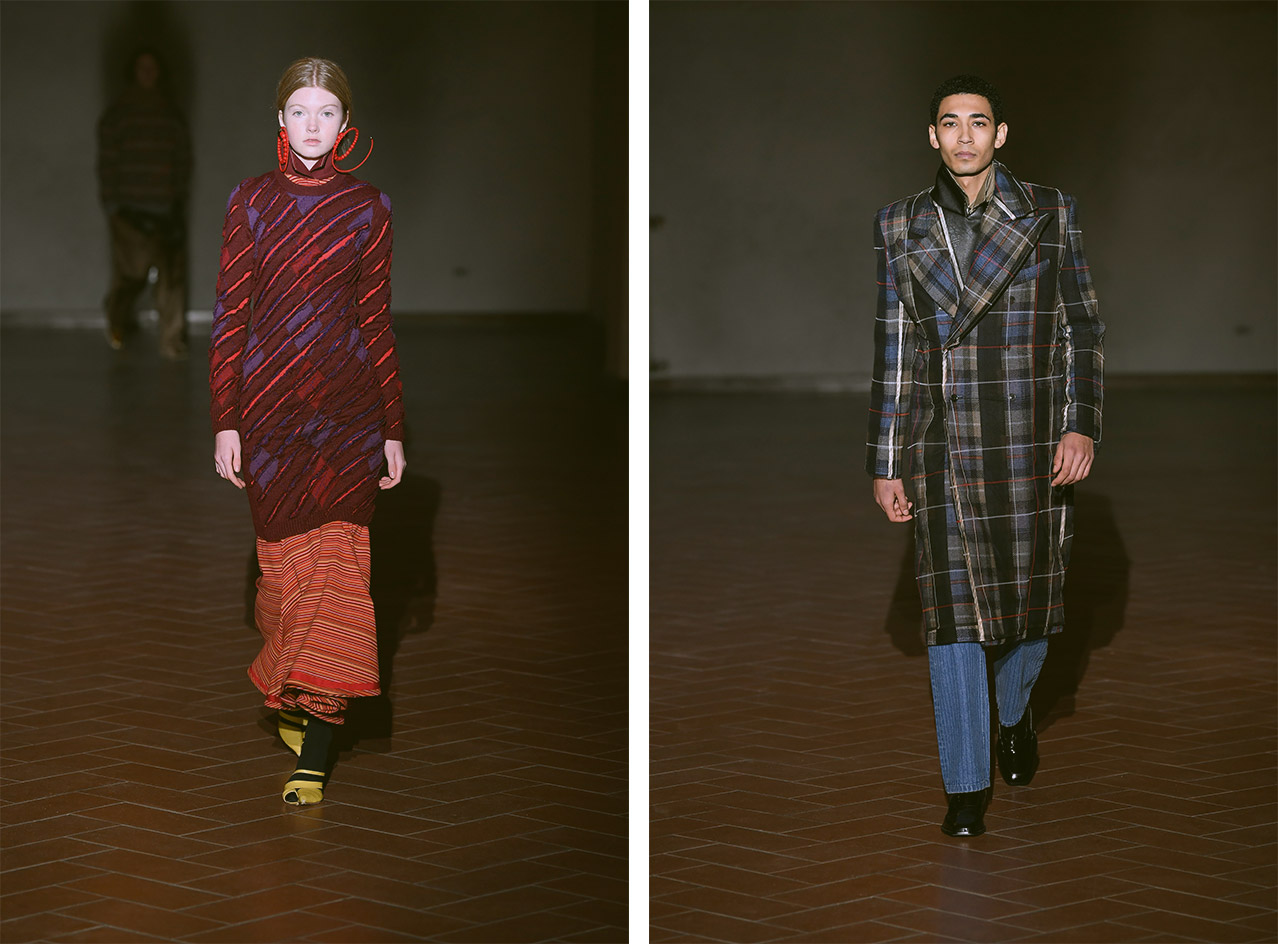
Y/Project: Guests were ushered into the Santa Maria Novella church at dusk, each of us handed a torch. Plunged into winter darkness, these flashlights became the only source of illumination to Martens’ surreal show, as haphazard globes tripped around the cloister, echoing the stars in the sky above. The surreal is Martens’ metier. With their playful, eccentric glitches, his clothes were both fiercely fresh and prophetic. Over the last five years his ‘deconstructionreconstruction’ approach has influenced a lot of what we see now – the pop-up pants and double-shoulder shirts for which he has become known were this time softer and rooted in a perverse play on notions of masculine luxury. ‘It is about menswear but looking at all of the different types of guys who come through Y/Project and who exist. This led to more experiments with tailoring. A lot more than before,’ he said. Heteronormative codes are critiqued and cut up: Argyle sweaters are slashed or wrapped into layers of printed tulle. Denim jeans are given curved seams, rich classic camel coats and sleek dinner suits are messed up. The vitality of the clothes was far from the flush pomp of pop. They were a rallying cry for more conceptual, artistic discourse in a superficial, troubled world.
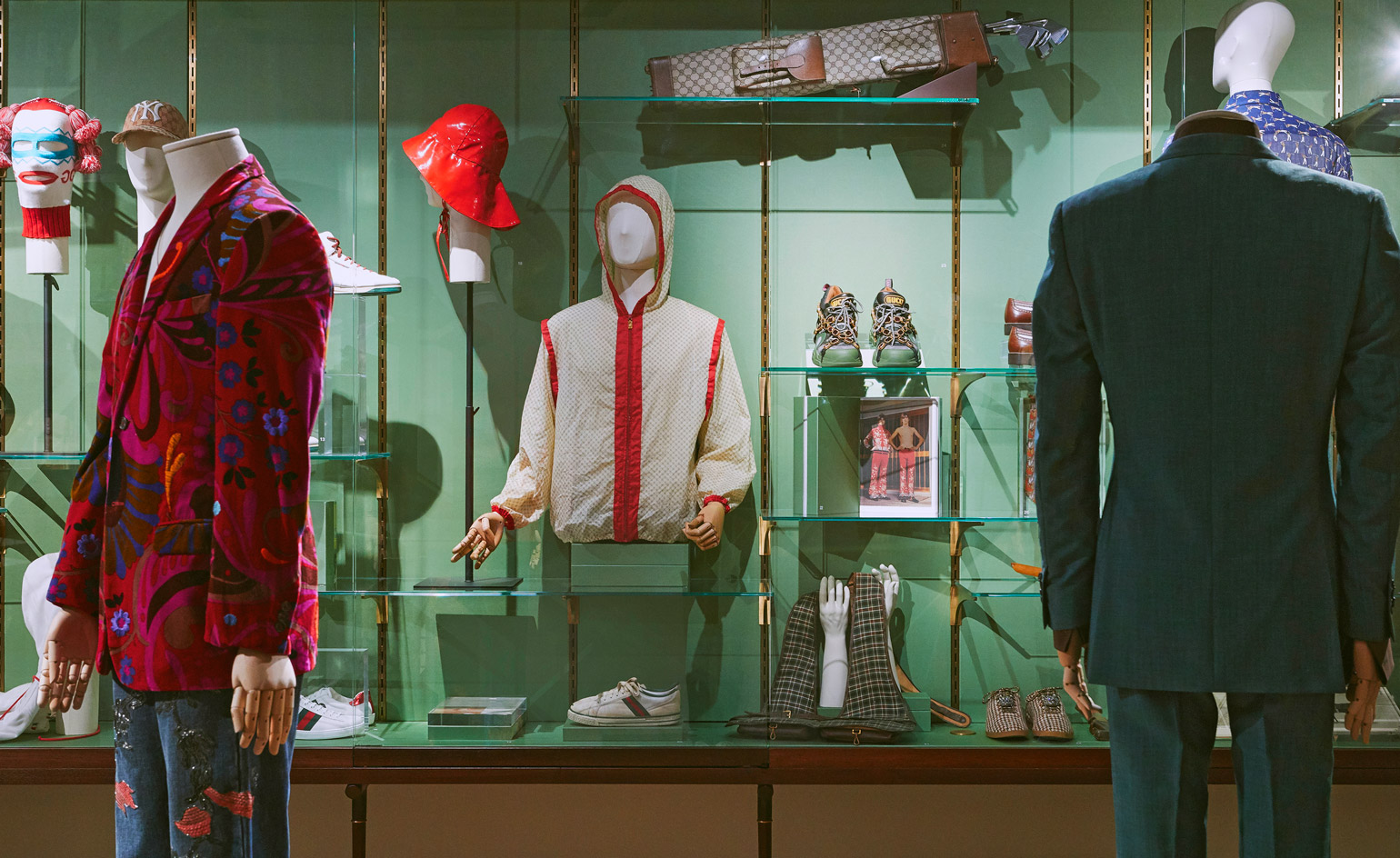
Gucci: New, fantastical wall paintings by Italian artist MP5 and the British painter Alex Merry have been unveiled at Gucci’s cultural residence located inside the historic Palazzo della Mercanzia in Florence’s Piazza della Signoria. Open too is a new exhibition The Male – Androgynous Mind, Eclectic Body, curated by Maria Luisa Frisa. The show unpacks how the brand has both presented and defined notions of the male body since the 1960s. Its title is a reference to the prophetic words of 19th-century poet Samuel Taylor Coleridge: ‘A great mind must be androgynous.’ A fitting message in our pluralistic times.
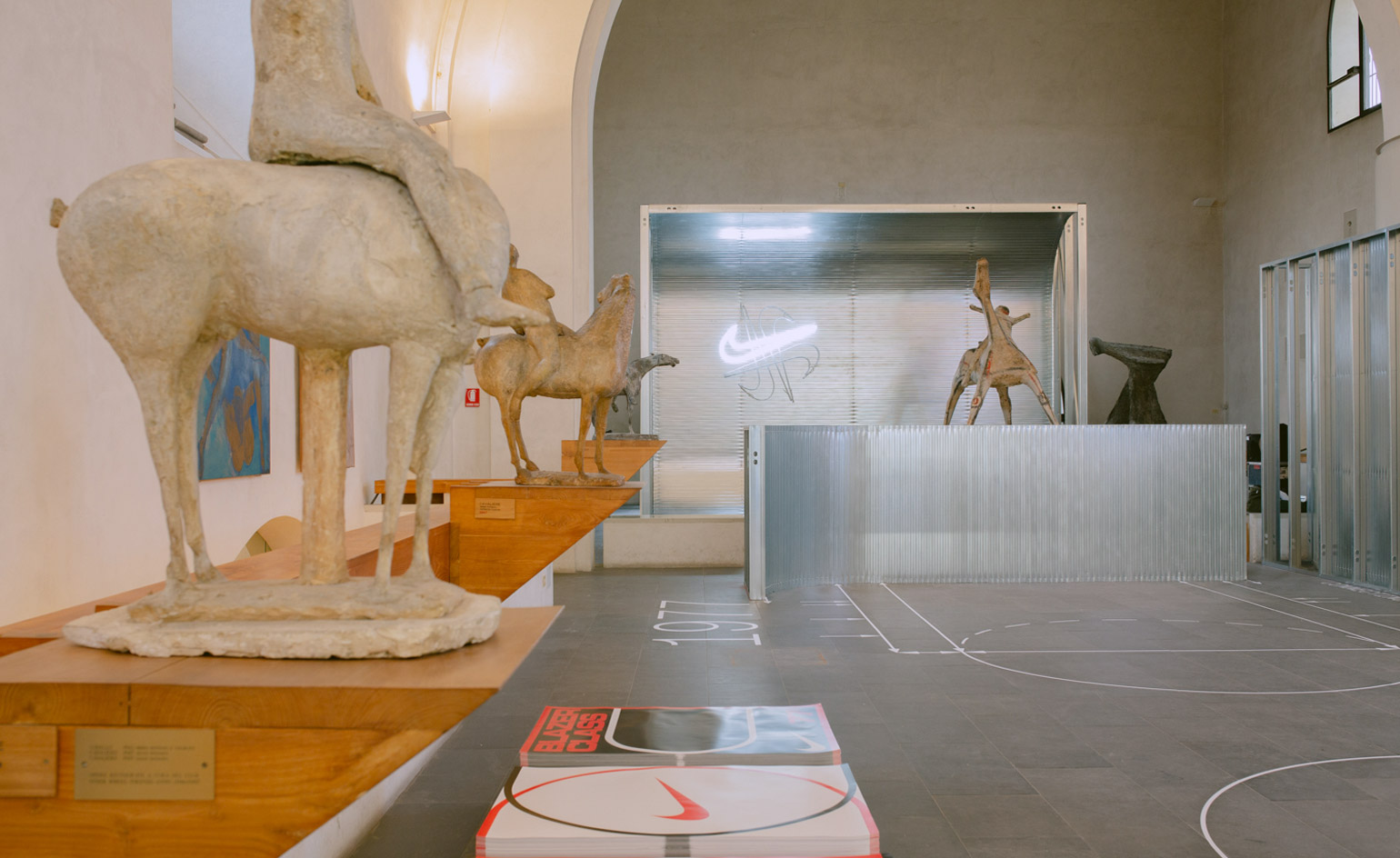
Slam Jam: The multifaceted company celebrated thirty years with a series of special projects in collaboration with long-standing partners including Carhartt WIP, Nike and Stussy. An exhibition inside the Museo Marino Marini began with a performative installation by Paris-Danish duo OrtaMiklos initiated by Carhartt WIP and Kaleidoscope magazine. Slam Jam was founded as a clothing distribution company in 1989 by Luca Benini when streetwear was just that. Today, as fashion and the street have collided in the most ostentatious ways, Slam Jam functions as a retailer, licensee and cultural hub. It has a firm place in streetwear-lore.
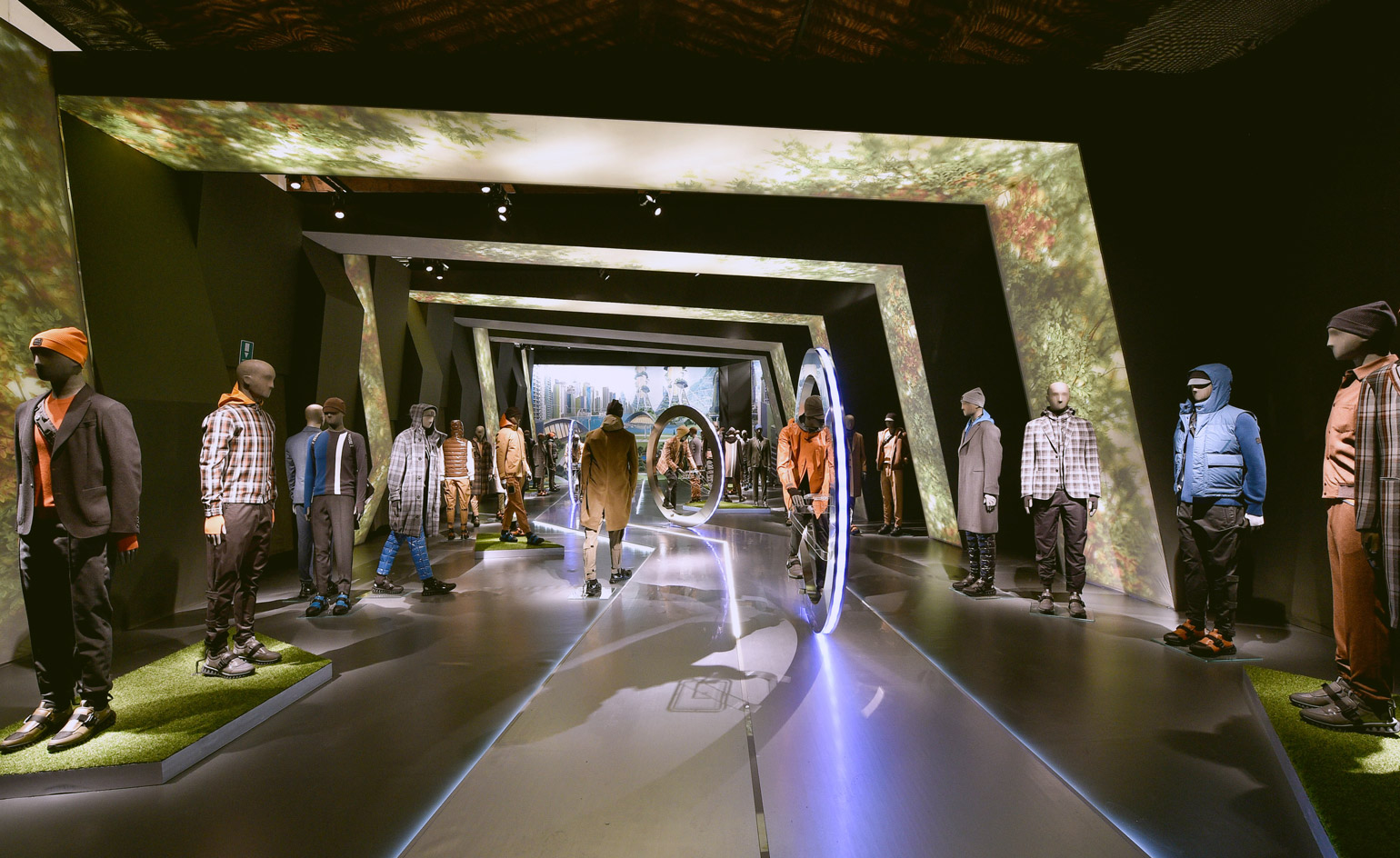
Z Zegna: Performance-lead tailoring is what you go to Z Zegna for. Its pioneering TECHMERINO™ fabric suit regulates body temperature and can even be thrown into the washing machine! A/W 2019 was influenced by cycling in the city; modular constructions were applied to a sleek, swift silhouette. Technical wool joggers had reflective box bags attached high on the leg. Deconstructed cargo trousers were worn with fitted knitwear that featured thumb-holes engineered into their cuffs. Paired with breathable, tailored jackets, this is the apogee of dynamic dressing.
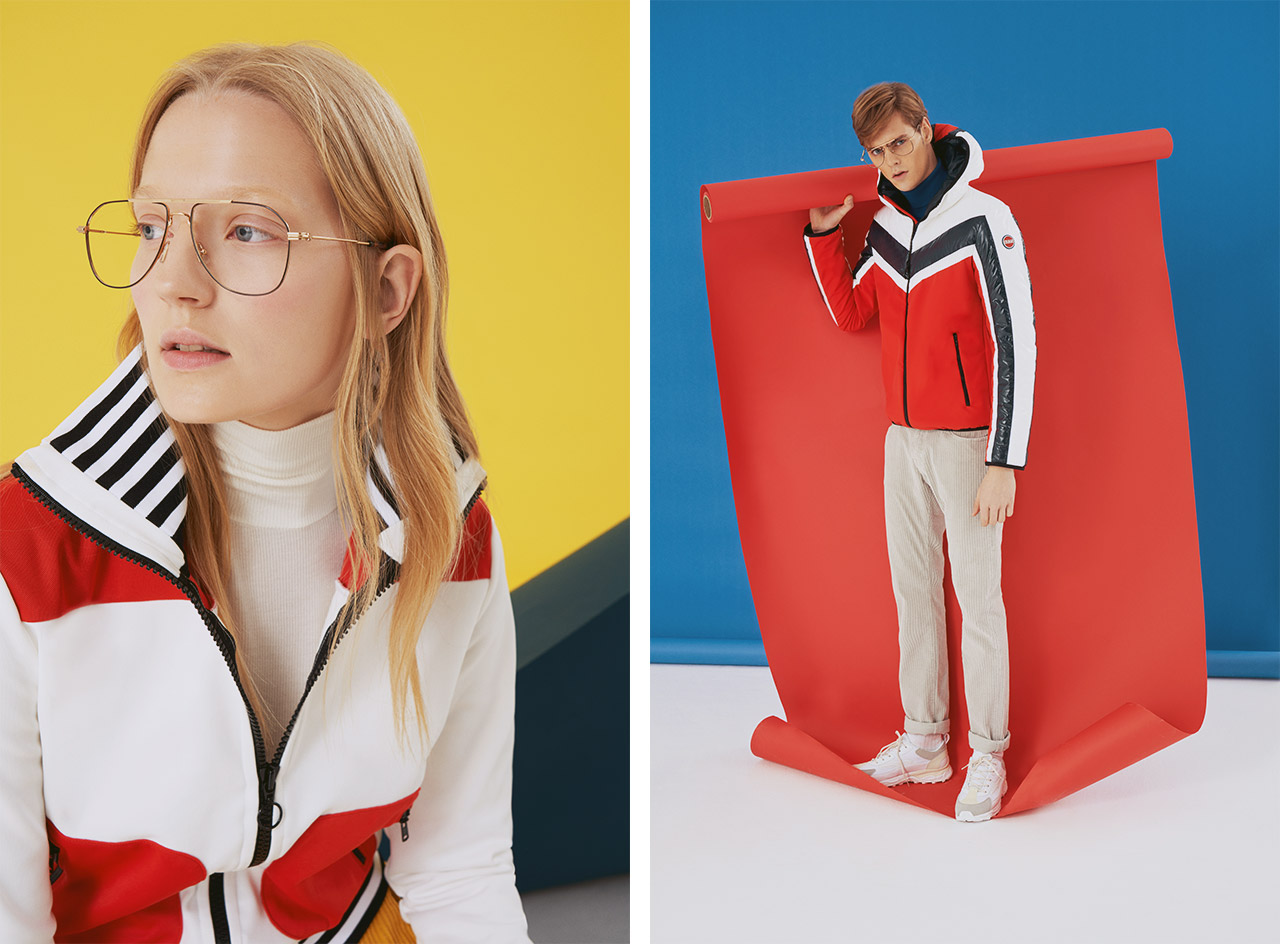
Colmar: The brand looked to the archives to celebrate its skiwear history for the coming season. Its Originals by Originals line of outerwear draws on 1970s sporting triumphs, when the Italian team scored legendary victories at the Sapporo and Innsbruck Winter Olympics, as well as the Saint Moritz World Championships, wearing head to toe Colmar. For A/W 2019, down-filled jackets with ribbed cuffs and hems display contrasting horizontal stitching and lateral bands. Slim fitted padded styles feature vertical quilting and colour blocking in red, blue and violet, taken directly off the vintage Alpine slopes.
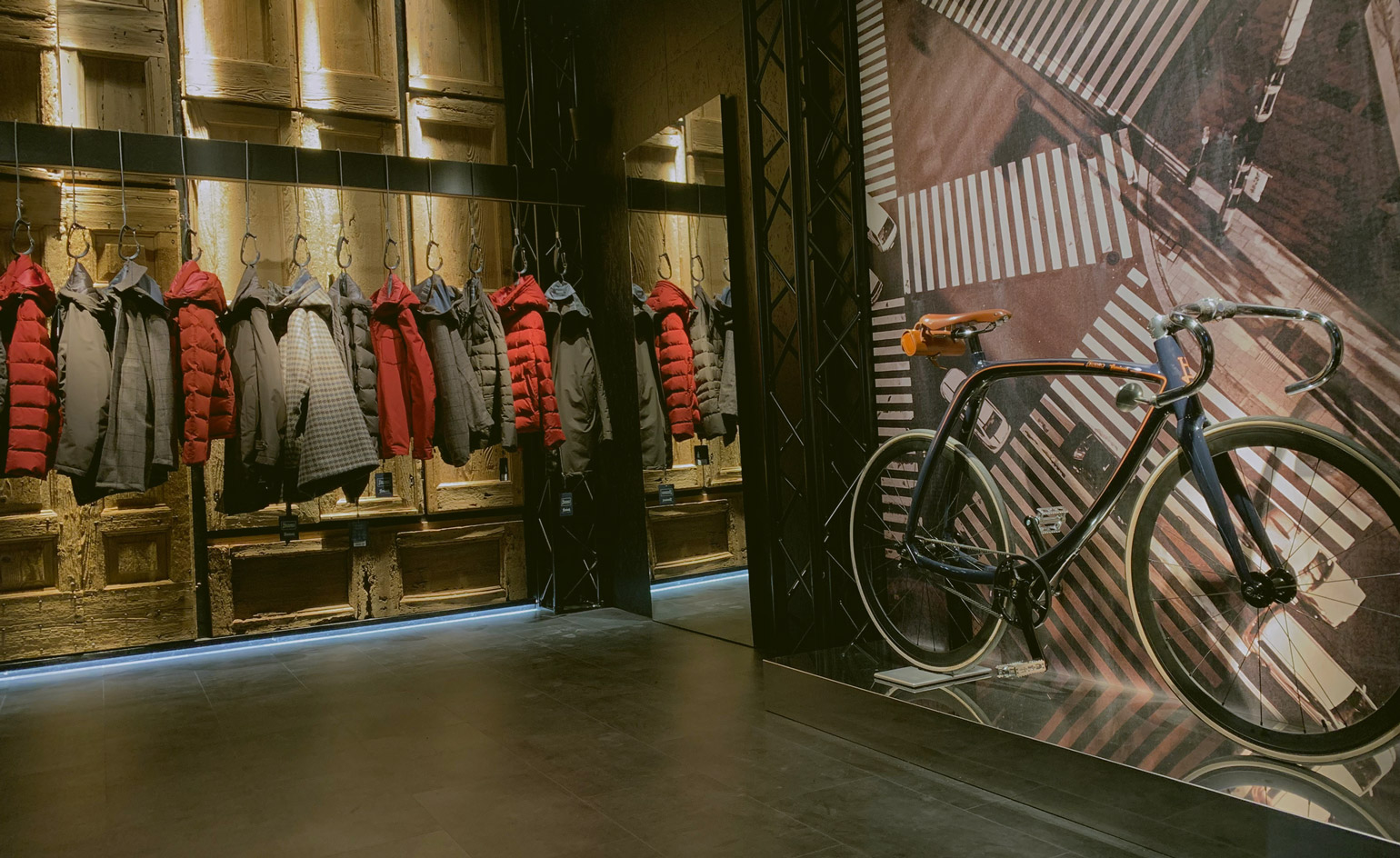
Herno: Italy is the home of sartorial sportif. Outerwear brand Herno began 70 years ago manufacturing raincoats; now it continues to build on its Laminar collection introduced in 2012 as a collaboration with Acronym designer Errolson Hugh, who employed only Gore-Tex fabrics. For A/W 2019, the brand has adopted a ‘functionality beyond aesthetic’ M.O. to create a rigorously researched, tailored outerwear collection of 28 styles that perform under all conditions. Inner membranes and treatments are applied to classical menswear textiles like wool and flannel. Check and houndstooth merge with special 2Layer and 3Layer sheaths to make parkas, field jackets, bombers and trench coats resistant to water, wind and fad.
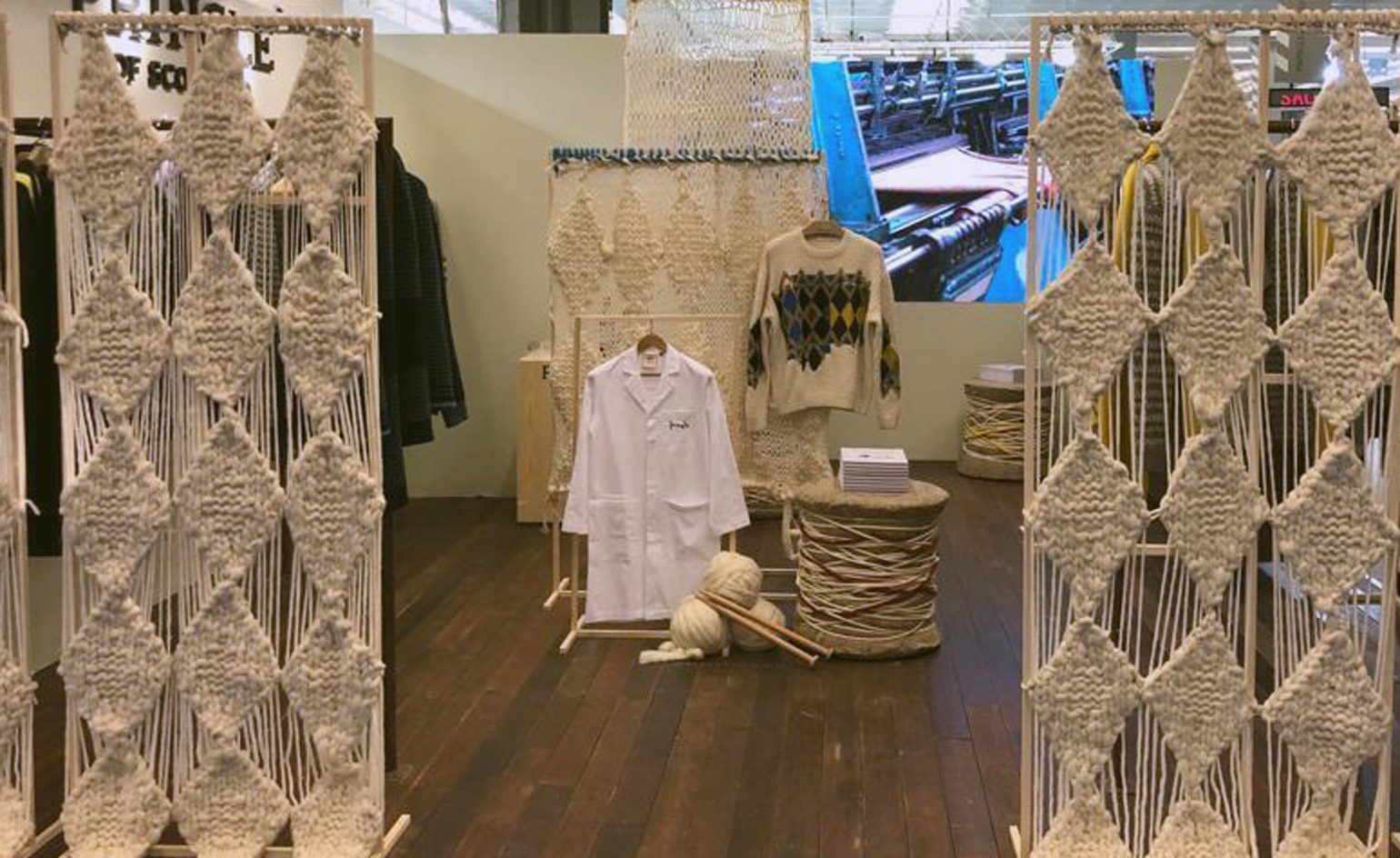
Pringle of Scotland: For A/W 2019 the label took a trip to the Outer Hebrides, resulting in a rugged nubby collection of sweaters and wool separates. Colours, logos and a preppy style are taken from the company’s archives, though much of the collection refers to the work of the eminent artist Charles Rennie Mackintosh. In the 1920s Mackintosh created a bold diamond motif for homeware textiles, which the designers have translated into a deconstructed argyle. It is edged in bold block intarsia outlines or digitally printed over round-neck knits. The look is notably relaxed; sportswear-inspired joggers, hoodies, soft cardigans. Warp, weft and warmth.
Wallpaper* Newsletter
Receive our daily digest of inspiration, escapism and design stories from around the world direct to your inbox.
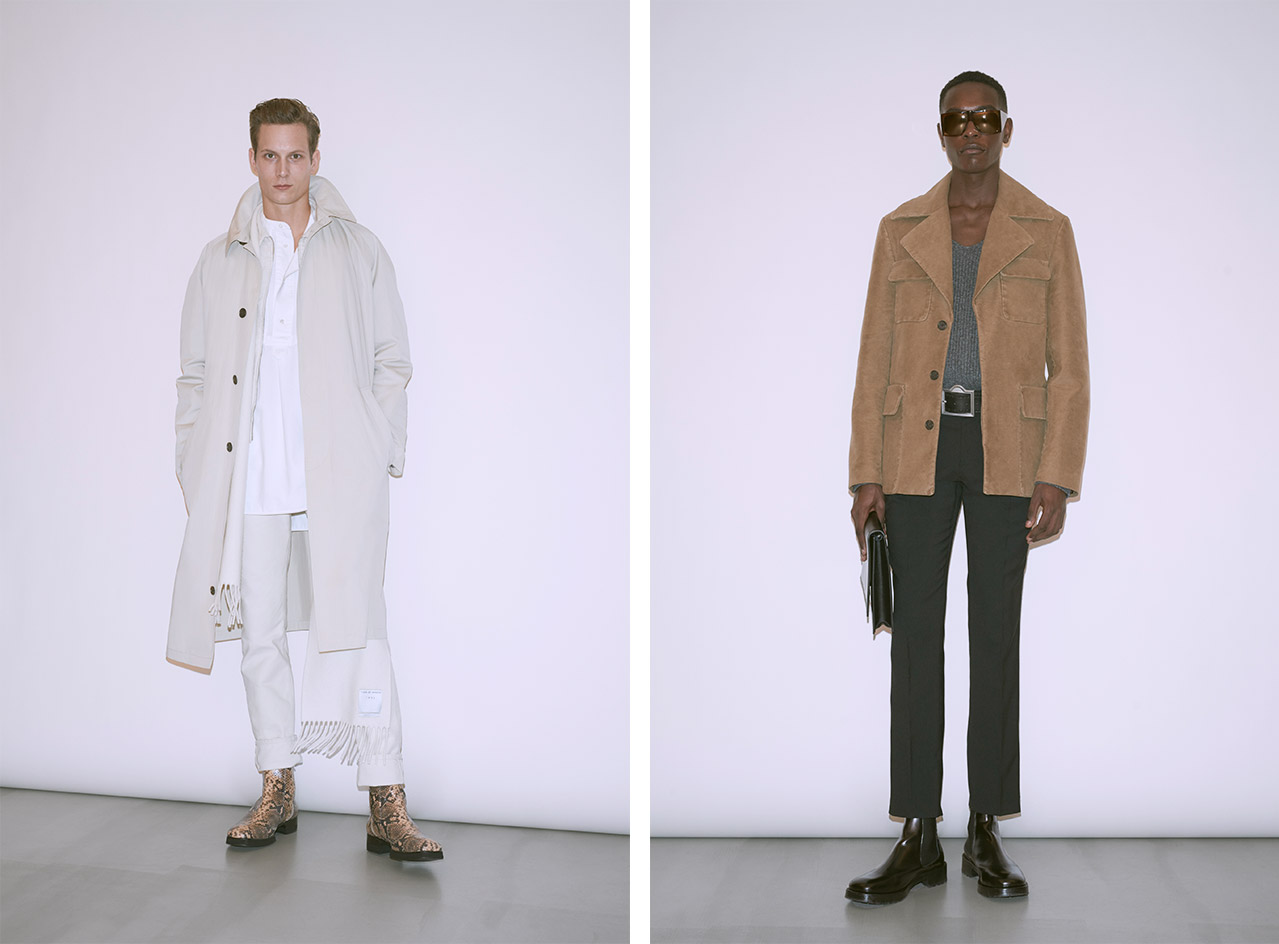
Tiger of Sweden: It was all about relaxed elegance and art deco modernism at Tiger of Sweden. Creative director Christoffer Lundman looked to the brief creative period between the mid-1910s and the early 1930s known as Swedish Grace. ‘In Europe it was Art Deco but in Sweden it became much more classic mixed with modernism. A super-creative neo-classical movement that was very short. Very intense. And had a lot of really inspiring people, buildings and thoughts,’ Lundman said. Subtle historical details pepper the collection throughout with a utilitarian mien; pleated tuxedo shirts sway with gentle broderie anglaise trims. Cashmere cotton shirting has a longer line inspired by nightgowns. Prints on fine silk coats carry photographic studies of delicate engravings originally made by Edward Hald and Simon Gate for Orrefors glassworks, prime examples of Swedish Grace that Lundman found in the Småland archives.
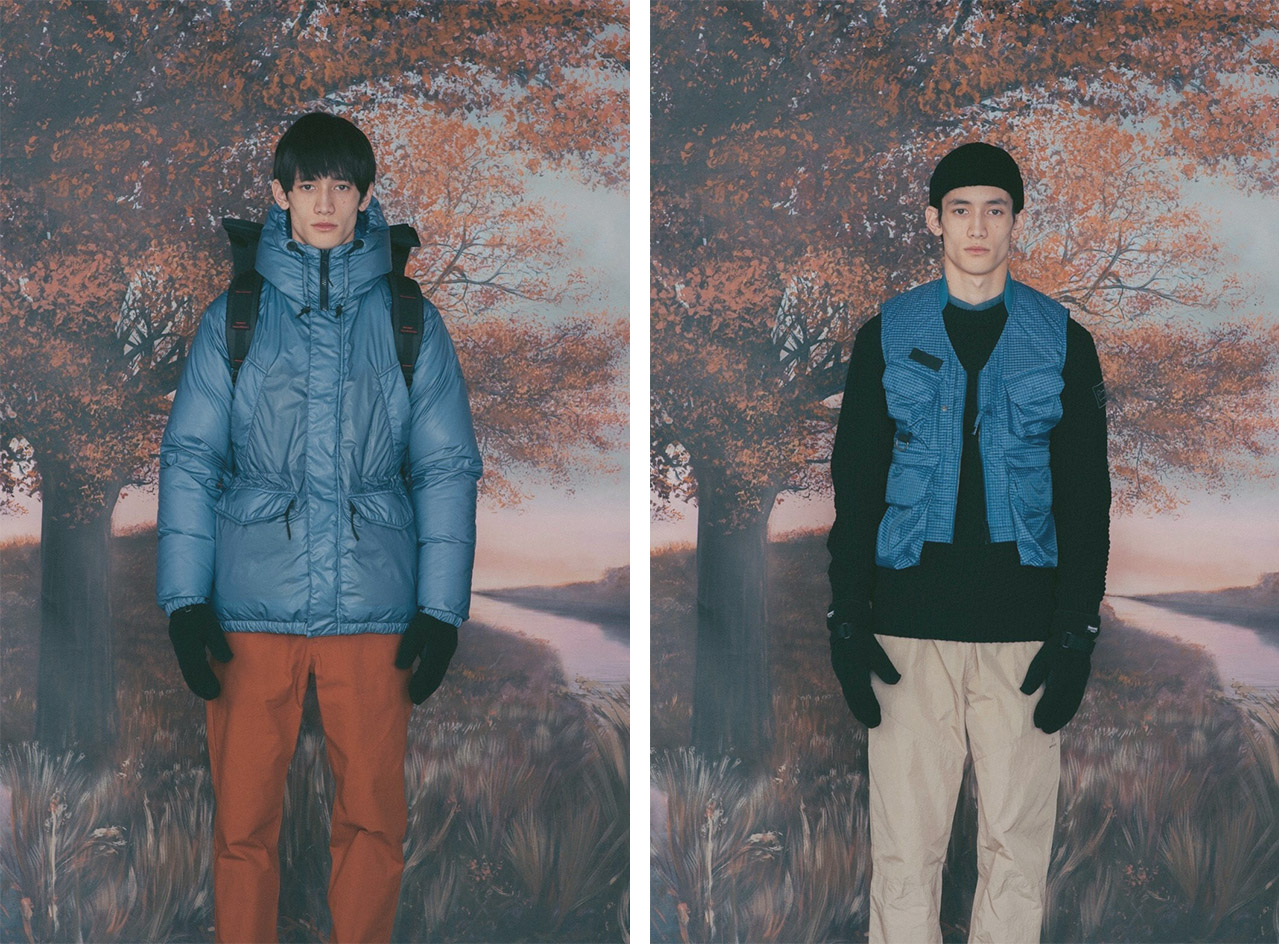
Woolrich: In celebration of the 20th anniversary of Beams – the stalwart American brand has collaborated with the Japanese retailer on a special capsule. It remixes a puritan utilitarianism with Japanese elegance. The team at Beams studied catalogues within the archives dating back to the 1900s and were inspired by the pieces made for big game hunting. The original hunting check has been updated and the collection features a cape shoulder lumber jack coat, hunting breeches and railroad vest. A/W 2019 also marks the fourth edition of the brand’s collaboration with British designer Jeff Griffin which includes reversible parkas made from surplus materials.
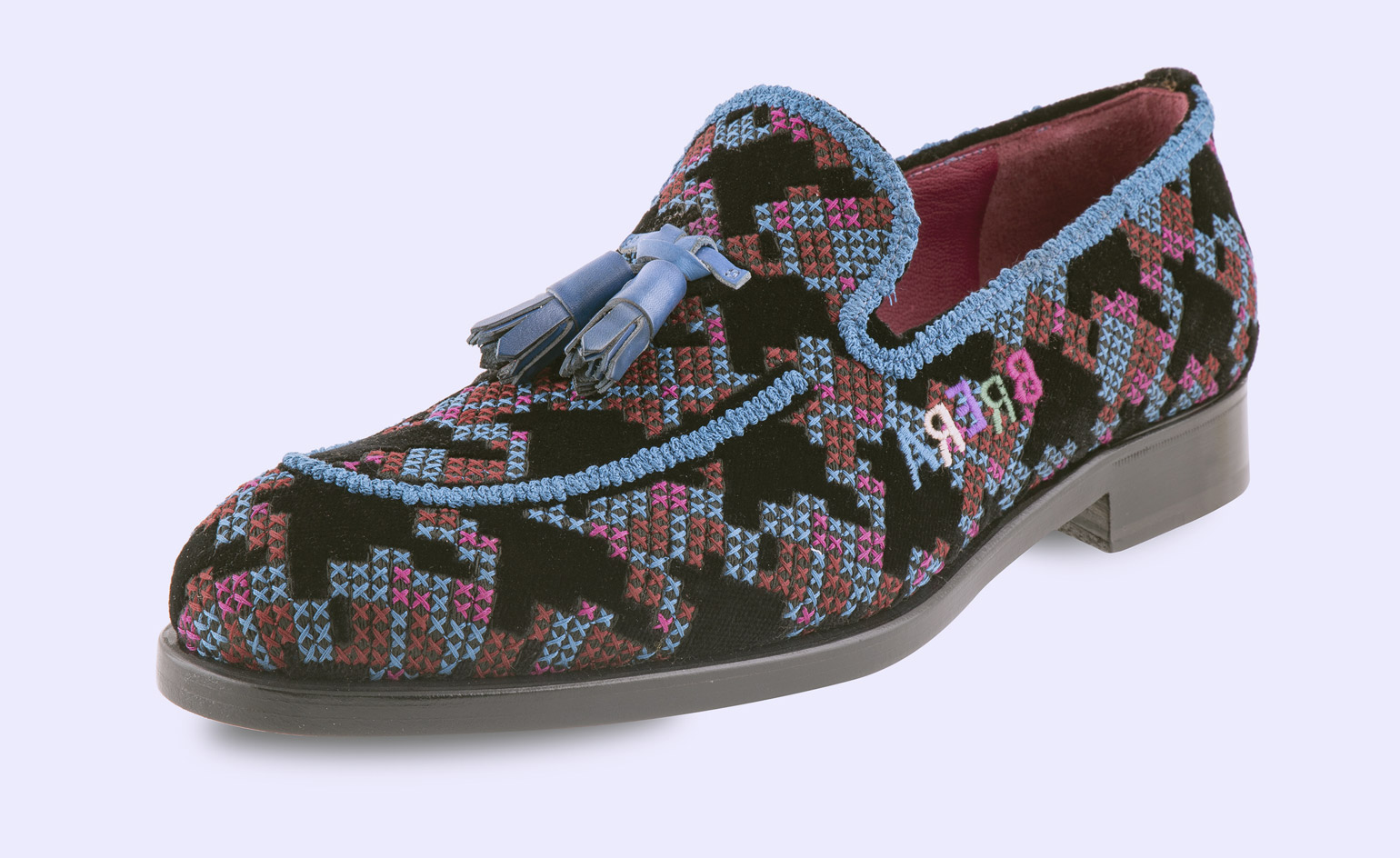
Fratelli Rossetti: The brand has updated its classic Brera tasselled loafer (which turned 50 last year) with a range of textures and embroideries taken from Scottish tartan. They are made using the ‘Toledo Exclusive' technique, where artisans manually colour the natural leather and hand draw the pattern. The full collection for A/W 2019 looks to archetypal Scottish clothing and its sartorial heritage – from the diagonal patterns of argyle to houndstooth and kilt pleats. Contrast argyle stitching appears on the upper of lace up moccasins and leather fringing peaks from the top of a half-monk style.
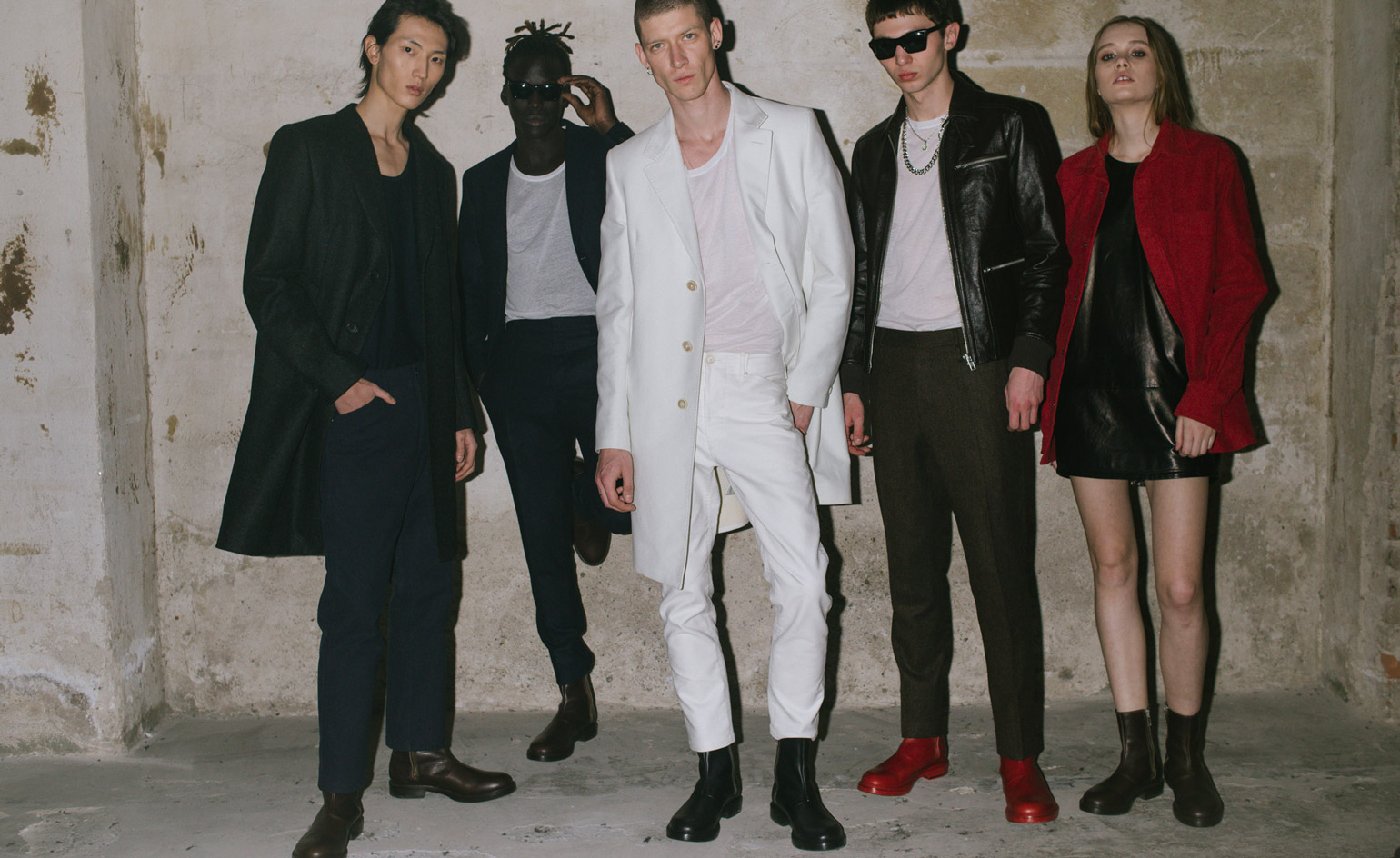
Aldo Maria Camillo: Most recently, Camillo had been a consultant with Haider Ackermann at Berluti. Before this, he’s had stints at Valentino, Zegna and three years as creative director at Cerutti. A/W 2019 marks the launch of his straightforward, no-frills, namesake debut. His work is focussed on the spirit of sartorial tradition and tailoring; it is a uniformly, archetypal Italian look. Entitled ‘Radici’, the collection is an ode to Camillo’s influences. ‘The place of my memory. Representing the 90s, the military vintage looks, the years of Martin Margiela and Helmut Lang, of the sartorial jackets ‘stolen' from my father's closet that made me feel like the artistes of the bands I was listening to,’ he said. The show opened with heavy wool navy peacoats worn with slim, khaki trousers and boots. Street sprezzatura.
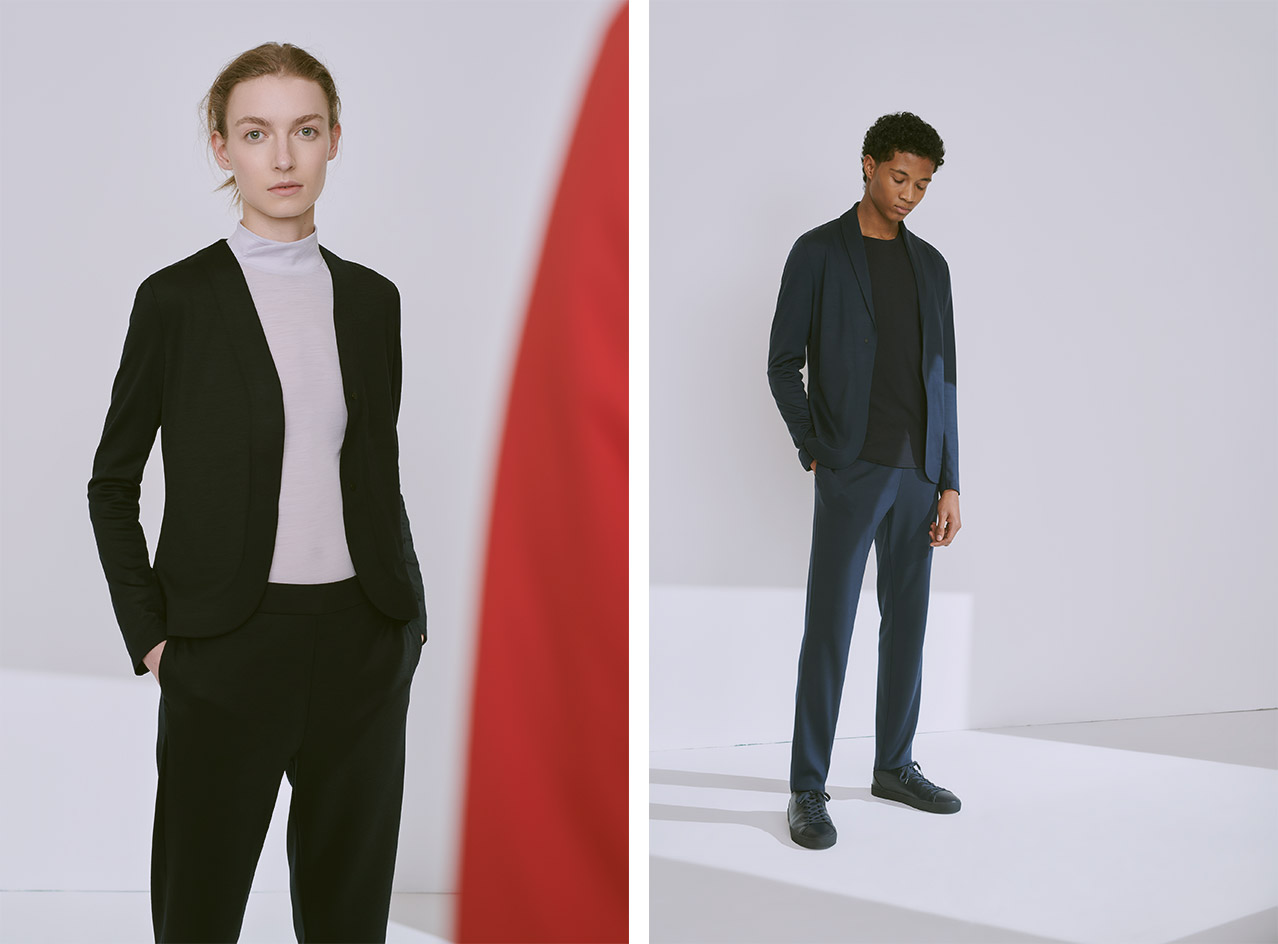
Aeance: In just four years, Nadine-Isabelle Baier and Arendt van Deyk have created a buzzy, minimalist tech apparel brand that meets the demands – and politics – of modern life. This is activewear free from logos and seasonal hype; eco-sustainability and ethical responsibility are high on the agenda. For their third collection, the duo collaborated with industrial designer Konstantin Grcic on a nine-piece capsule, evolving their look into a more tailored direction. 96% of its textiles are recycled, purely natural, biodegradable or bio-based. Chic, reductivist, radical fashion – and their most sustainable yet.
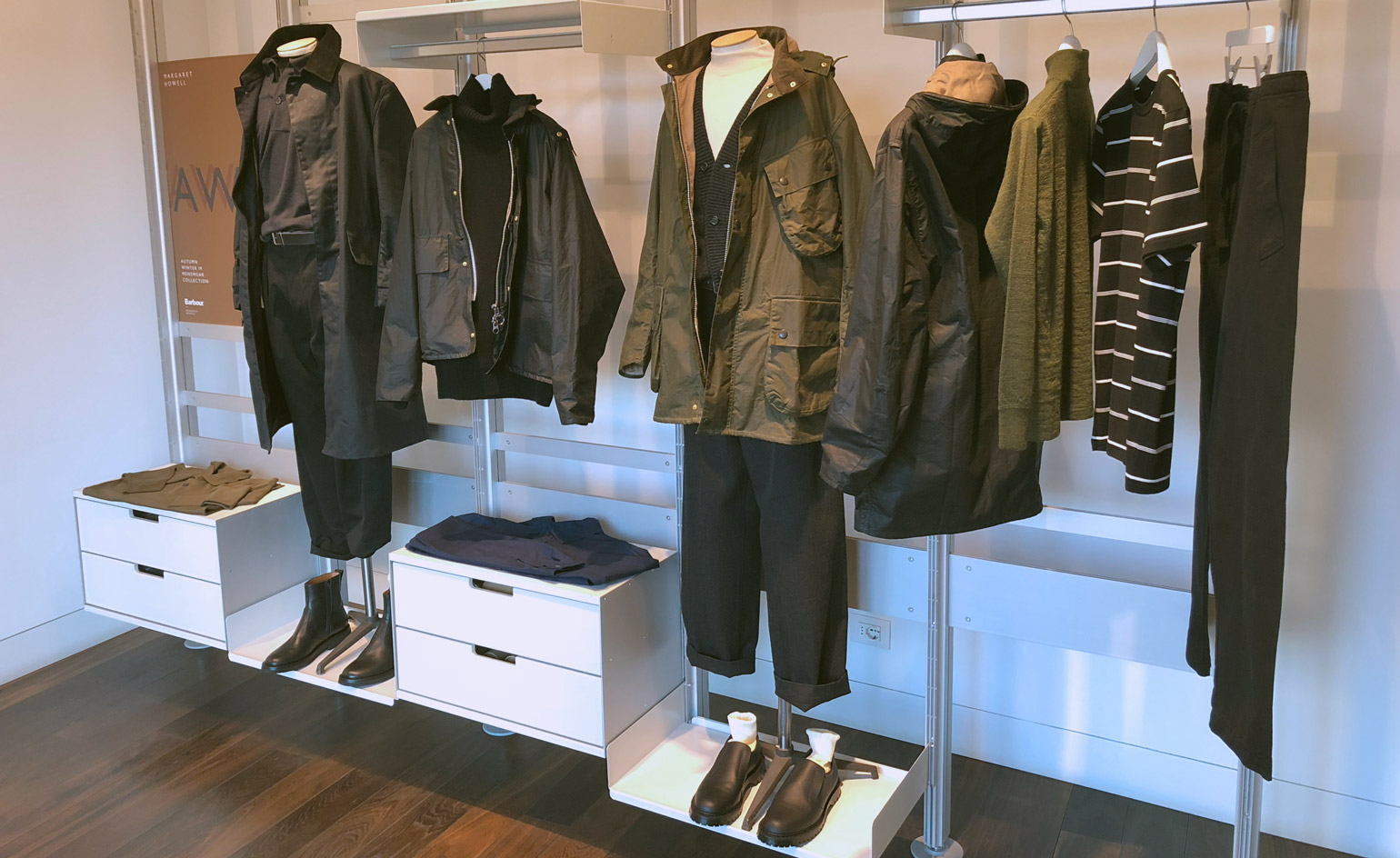
Margaret Howell: The discreet hardiness of Howell is a welcome palate cleanser within the context of Pitti’s widespread tailored-tech approach. Her clothes function as protection, but they do not shout about it. For A/W 2019, this safeguarding comes through as a capsule of three Barbour jackets, adapted from original styles in the Barbour archives. Standout is a boxy, cropped shape in the quintessential wax cotton. Elsewhere, MHL knitwear is based on classic thermals. New for the mainline is a riff on the women’s cashmere wide roll neck, now available for men in deep black and nubby bronze.
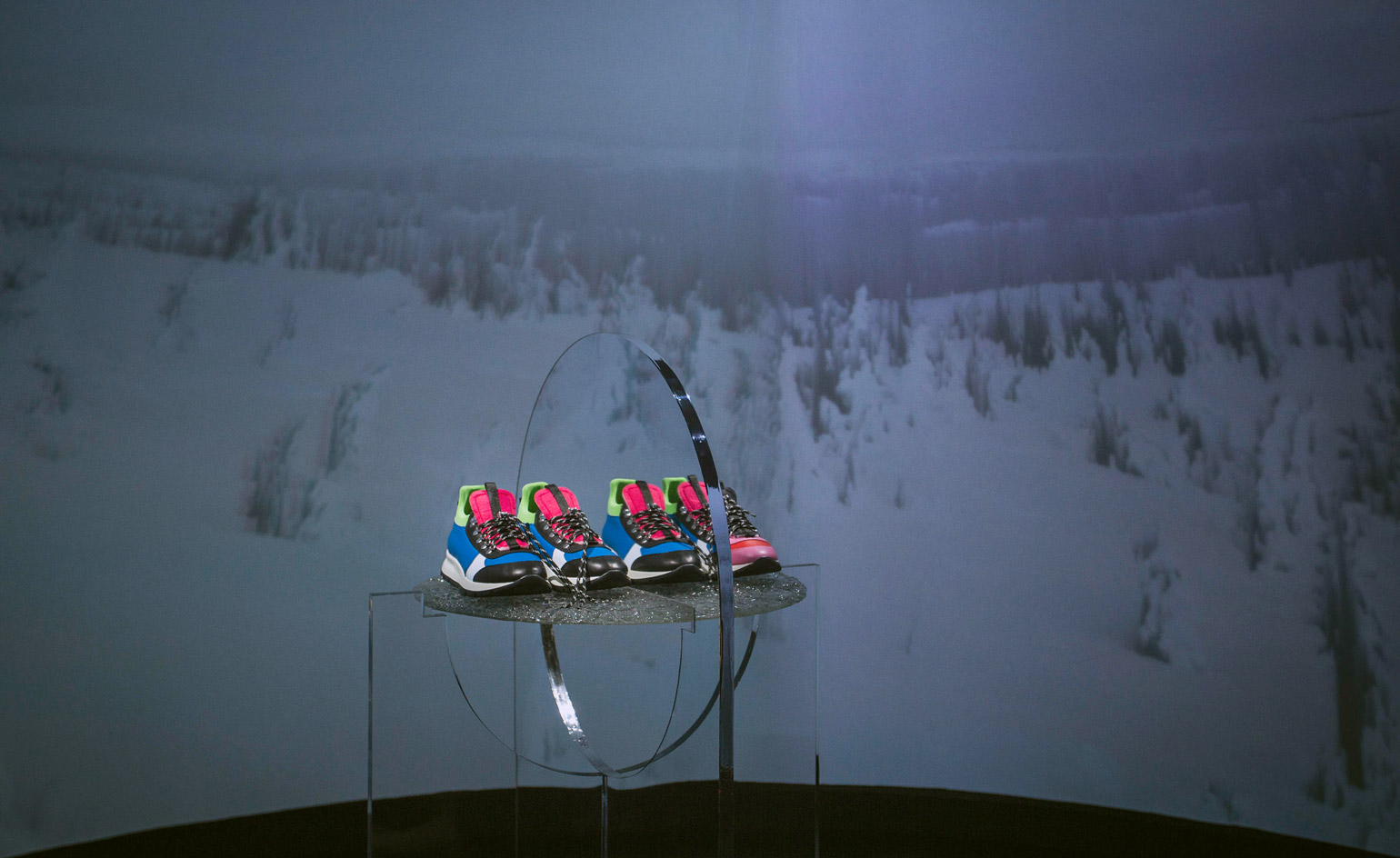
Rossignol: The venerated French mountain-wear company have collaborated on a capsule of sneakers with Philippe Model. An ex-milliner, Model launched his namesake brand in 1981 and went on to work with Jean-Paul Gaultier, Claude Montana and Issey Miyake. Since 2008, Paolo Gambato has been creative director and today the brand is known for its high-end, elegant line of sneakers. For A/W 2019 Italian craftsmanship meets French style; a sneaker with an agile running sole features technical fastenings and a padded collar influenced by the lining of ski boots.
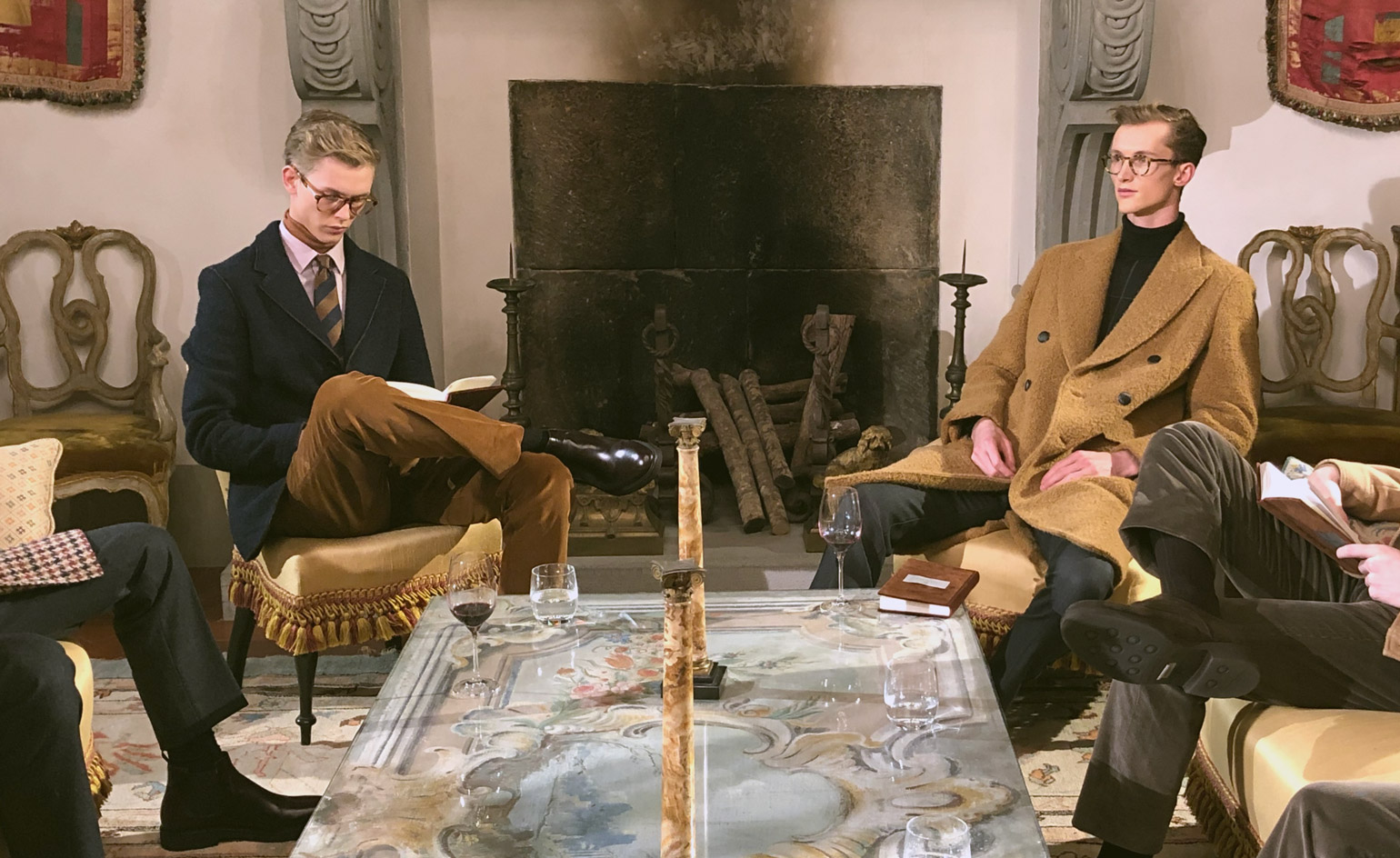
Canali: Working lives have changed – so modern suiting has to move with the times. Canali fused tailoring tradition with a contemporary informal style creating something they called ‘soft-wear.’ A well crafted, well made suit in baby alpaca, light cashmere-vicuña and weightless cashmere-silk has a relaxed rigour. Black Edition – a new capsule – takes a more tech approach. The Leaftec jacket is built with a special triple layer fabric ultralight and highly resistant to wind, rain and abrasion.
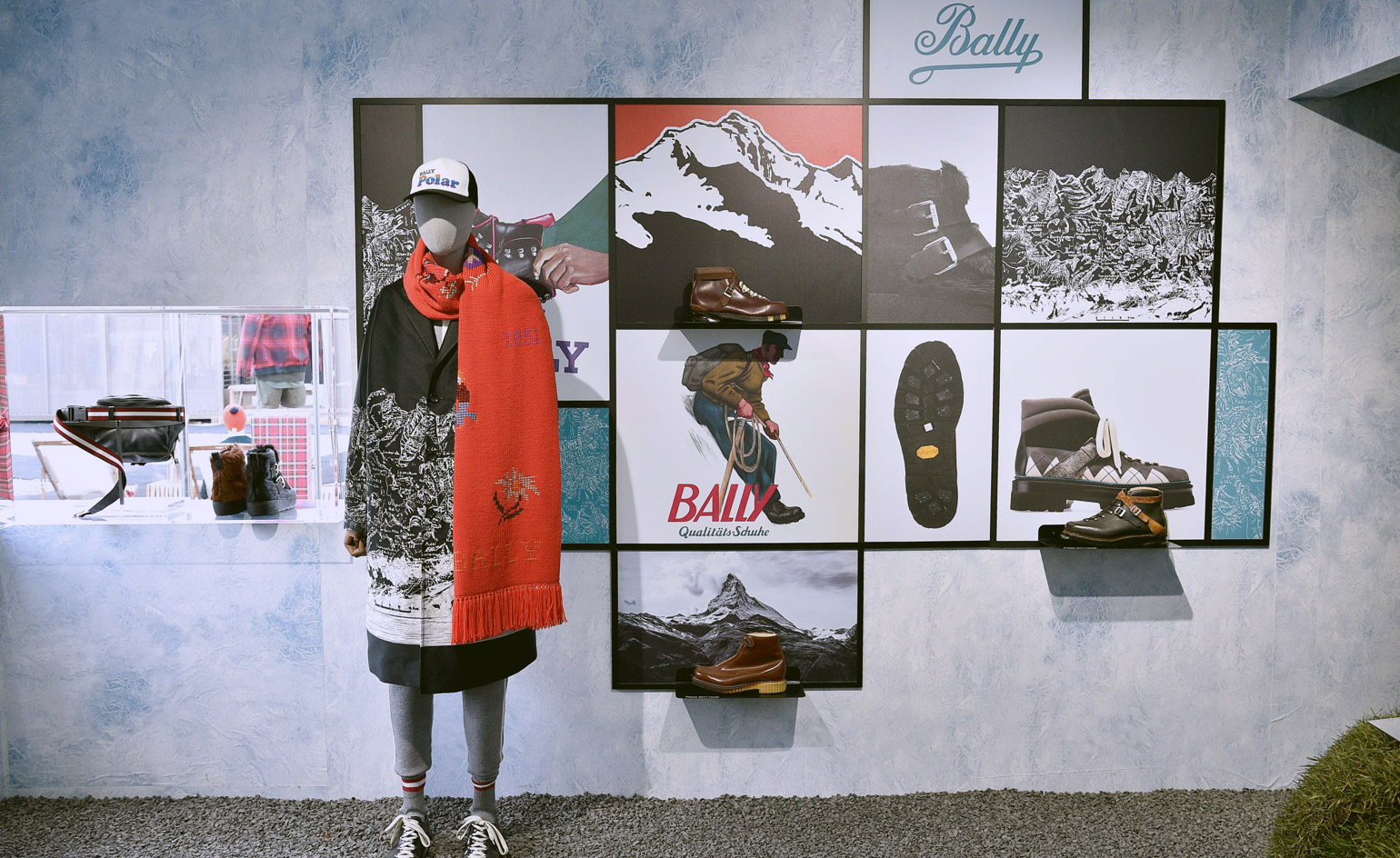
Bally: The brand pays homage to its alpine roots in a collection named after three renowned Swiss peaks. The shoes are all based on hiking styles taken from the archives and updated for the streets. The Zermatt theme brings in a Vibram Arctic Grip sole, which gives the boots exceptional traction on snow and ice. Robust paramilitary boots feature leather welting and an XL extra light rubber lug sole. The Maloja collection includes silver buckles and triangular motifs. A range of fun backpacks and bumbags come decorated with contrast patches and hooks.
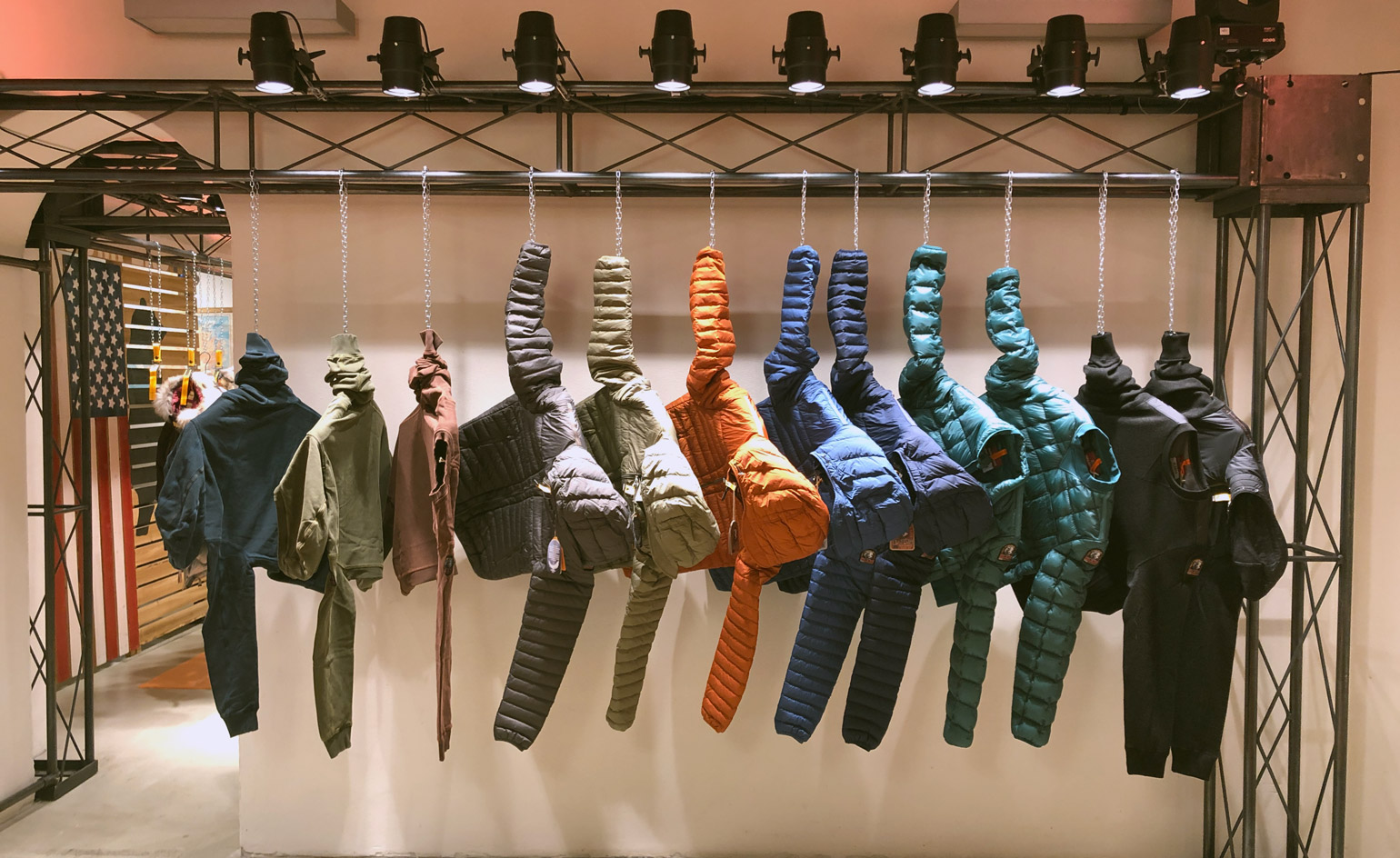
Parajumpers: Creative cirector Massimo Rossetti continues to unite technical know-how with modern design. Highlight for the season are a series of styles made with British Ventile fabric; a densely woven 100% cotton textile that swells when wet, keeping the body dry and its temperature regulated. A new capsule from long term collaborator Yoshinori Ono uses lightweight textured Cordura fibres that are built to last.
London based writer Dal Chodha is editor-in-chief of Archivist Addendum — a publishing project that explores the gap between fashion editorial and academe. He writes for various international titles and journals on fashion, art and culture and is a contributing editor at Wallpaper*. Chodha has been working in academic institutions for more than a decade and is Stage 1 Leader of the BA Fashion Communication and Promotion course at Central Saint Martins. In 2020 he published his first book SHOW NOTES, an original hybrid of journalism, poetry and provocation.
-
 Mercedes-Benz previews its next-gen people mover with an ultra-luxury EV concept
Mercedes-Benz previews its next-gen people mover with an ultra-luxury EV conceptThe Mercedes-Benz Vision V Concept is an art deco picture palace on wheels, designed to immerse passengers in parallel worlds as they travel
By Jonathan Bell
-
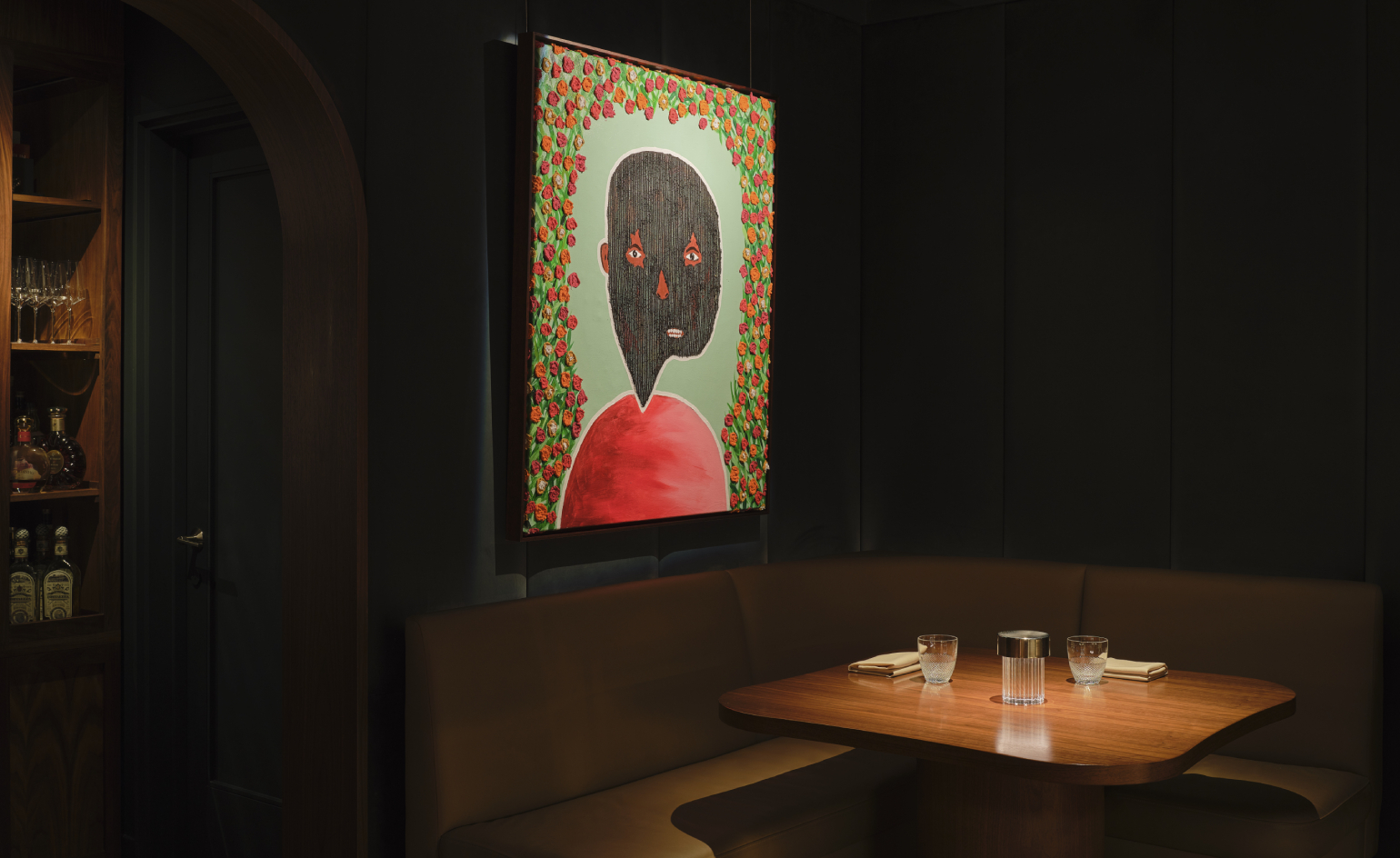 Visit this Michelin-star New York restaurant that doubles as an art gallery
Visit this Michelin-star New York restaurant that doubles as an art galleryArtist Mr.StarCity is exhibiting his emotionally charged yet optimistic ‘Bloomers’ portrait series at Frevo, a Greenwich Village hidden haunt
By Adrian Madlener
-
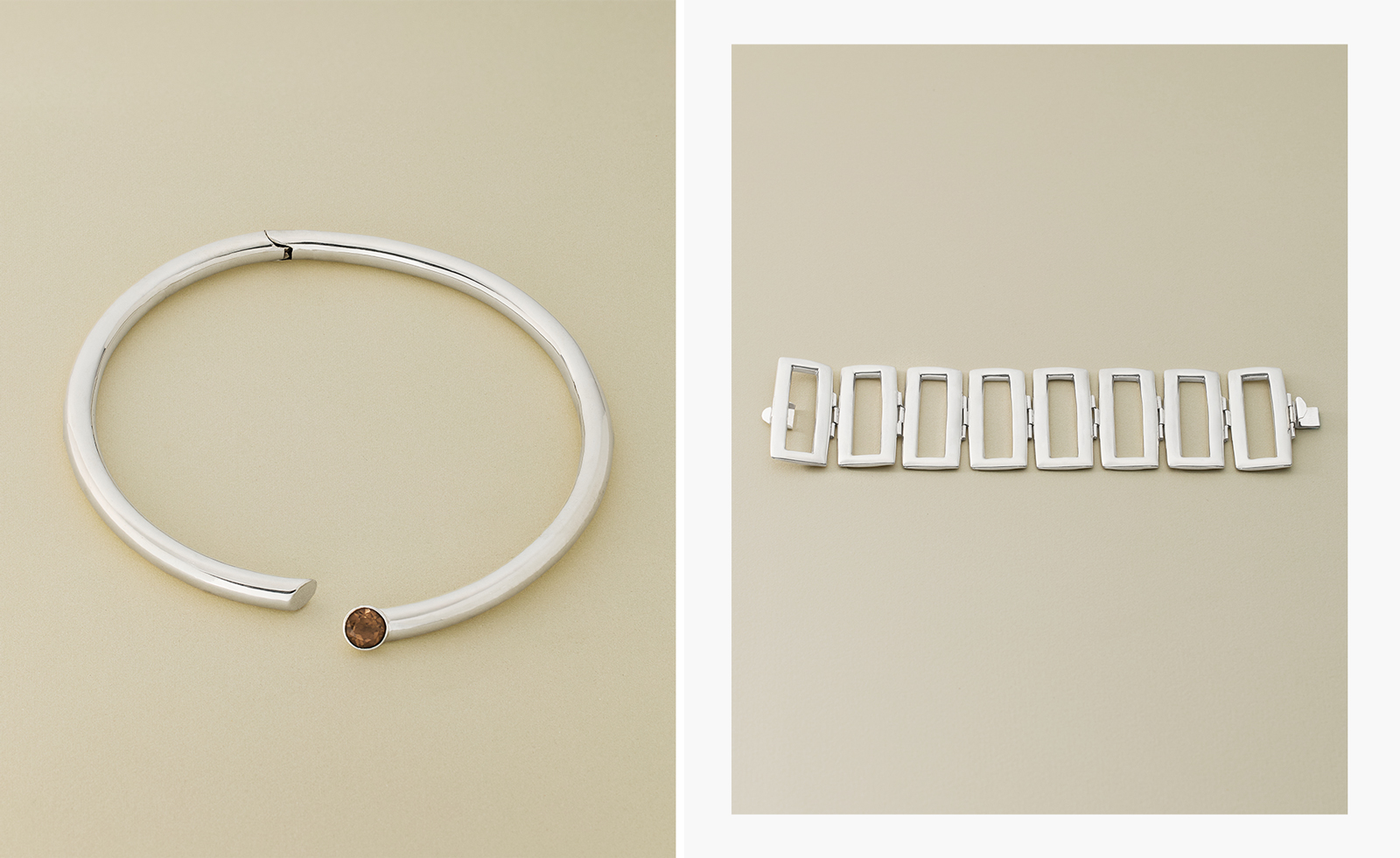 Nina Runsdorf brings classic jewellery back to life to mark 20 years
Nina Runsdorf brings classic jewellery back to life to mark 20 yearsNew York-based jewellery designer Nina Runsdorf celebrates her eponymous brand’s anniversary with a new jewellery collection, ‘Archive’
By Hannah Silver